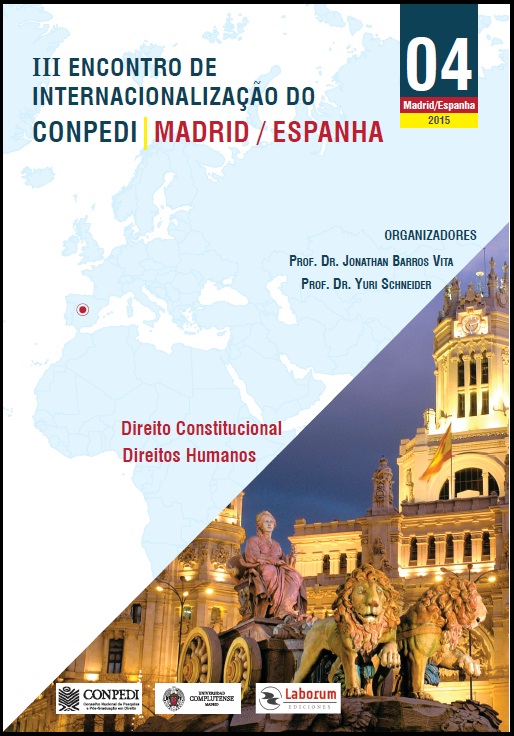Positivism and Constitutional Post- positivism : A Debate on Breast Theory of Fundamental Rights
Main Article Content
Abstract
This article, based on the theoretical framework of the philosophy of praxis, is to discuss the strained relations between power and justice in the enforcement of fundamental rights, making a comparison between the theoretical concepts of Hans Kelsen and Robert Alexy. In this sense, are compared the thoughts of these two authors, emphasizing the central role that power has the legal conception of the first as opposed to the theory of justice that animates the legal conceptions of the second. We discuss how this tension that appears in the theoretical confrontation of the two authors is actually a moment of real, but constitutes a dialectical interaction which must be observed and deciphered in the concrete application of the law. It concludes with the search of separation from what is real from what is in this ideological debate, seeking to deepen the debate on fundamental rights as the core of modern structural theory of law.
Downloads
Article Details
Autores que publicam nesta revista concordam com os seguintes termos:
O(s) autor(es) autoriza(m) a publicação do texto na da revista;
O(s) autor(es) garantem que a contribuição é original e inédita e que não está em processo de avaliação em outra(s) revista(s);
A revista não se responsabiliza pelas opiniões, idéias e conceitos emitidos nos textos, por serem de inteira responsabilidade de seu(s) autor(es);
É reservado aos editores o direito de proceder a ajustes textuais e de adequação às normas da publicação.
Autores mantém os direitos autorais e concedem à revista o direito de primeira publicação, com o trabalho simultaneamente licenciado sob a Licença Creative Commons Attribution que permite o compartilhamento do trabalho com reconhecimento da autoria e publicação inicial nesta revista.
Autores têm autorização para assumir contratos adicionais separadamente, para distribuição não-exclusiva da versão do trabalho publicada nesta revista (ex.: publicar em repositório institucional ou como capítulo de livro), com reconhecimento de autoria e publicação inicial nesta revista.
Autores têm permissão e são estimulados a publicar e distribuir seu trabalho online (ex.: em repositórios institucionais ou na sua página pessoal) a qualquer ponto antes ou durante o processo editorial, já que isso pode gerar alterações produtivas, bem como aumentar o impacto e a citação do trabalho publicado (Veja O Efeito do Acesso Livre) emhttp://opcit.eprints.org/oacitation-biblio.html
References
ALEXY, Robert. Teoria dos direitos fundamentais. São Paulo: Malheiros, 2008.
ANDRADE, Vera Regina Pereira de. Dogmática jurídica: escorço e sua configuração e identidade. 2. ed. Porto Alegre: Livraria do Advogado, 2003.
BOBBIO, Norberto. Direito e poder. São Paulo: Editora UNESP, 2008.
______. O positivismo jurídico: lições de filosofia do direito. São Paulo: Ícone, 1995, p. 212.
______. Teoria do ordenamento jurídico. 10. ed. Brasília: EdUNB, 1999.
CHAUÍ, Marilena. O que é ideologia. São Paulo: Editora Brasiliense, 1997, p. 91.
CORREAS, Oscar. El otro Kelsen. Ciudad de México: UNAM, 1989.
DERRIDA, Jacques. Força de lei: o fundamento místico da autoridade. 2. ed. São Paulo: Martins Fontes, 2010.
HABERMAS, Jürgen. Direito e democracia: entre facticidade e validade, volume 01. Rio de Janeiro: Tempo Brasileiro, 1997.
______. Direito e democracia: entre facticidade e validade, volume 02. Rio de Janeiro: Tempo Brasileiro, 1997, p. 181.
KELSEN, Hans. Teoria pura do direito. 6. ed. São Paulo: Martins Fontes, 1998.
KHUN, Thomas. A estrutura das revoluções científicas. São Paulo: Perspectiva, 2009.
LUHMANN, Niklas. Legitimação pelo procedimento. Brasília: Editora UNB, 1980.
______. Sociologia do direito I. Rio de Janeiro: Tempo Brasileiro, 1983.
MELO, Tarso de. Direito e ideologia: um estudo a partir da função social da propriedade rural. São Paulo: Expressão Popular, 2009.
WARAT, Luis Alberto. Introdução geral ao direito II: a epistemologia jurídica da modernidade. Porto Alegre: Sérgio Antônio Fabris Editor, 1995.





